Looking for the best Shopify sales trackers in 2026?
If you’re serious about growing your Shopify store, you need to know what the best-selling dropshipping products are for your competitors and why. Manually tracking that data takes too much time and often leaves you with incomplete insights or missing on new trends.
A Shopify sales tracker gives you instant access to competitor performance, product trends, and pricing history so you can make informed business decisions faster.
Here are the best Shopify sales tracking tools to consider this year.

Comparison Table: Shopify Sales Tracker Tools
| Tool | Benefits | Monthly Pricing |
| ZIK Analytics | Real sales data with product research | $39.9/month |
| Koala Inspector | Chrome extension for store analysis | $17/month |
| SellerCenter | Store tracking with curated lists | $9.99/month |
| Dropship.io | Daily sales tracking | $39/month |
| SpySales | Real-time sales tracking with AI | $25/month |
| Analyzify | Store data tracking and analytics | $79/month |
| PPSPY | Sales tracking with competitor research | $39/month |
| ShopHunter | Sales analysis with competitor insights | $50/month |
| WinningHunter | Sales tracking with ad insights | €49/month |
1. ZIK Analytics
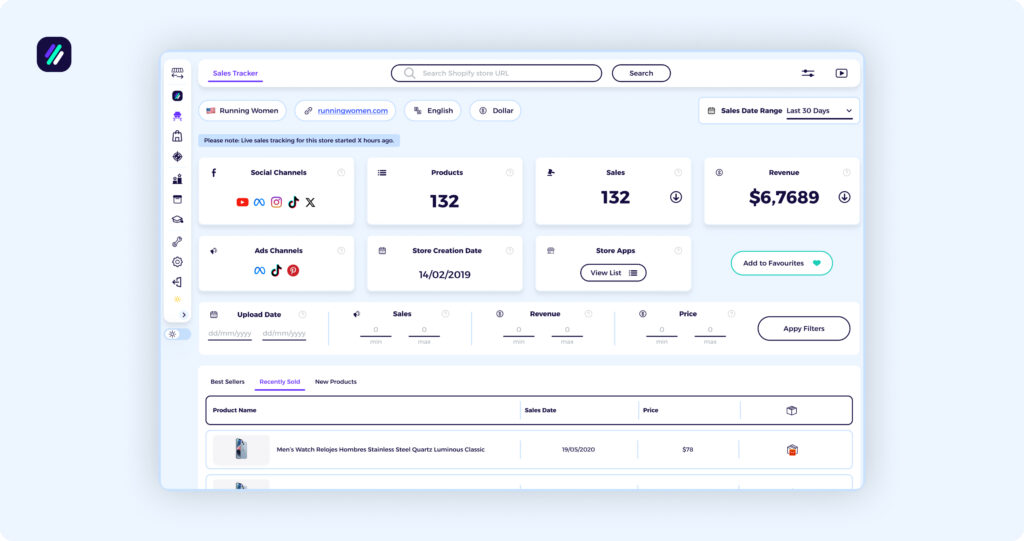
ZIK Analytics’ Shopify Sales Tracker shows you exactly how Shopify stores and products are performing, based on real sales data.
By real, we mean actual order counts, revenue estimates, and product sales history pulled from live Shopify stores. You can see historical trends to spot if demand for a product is growing or fading, as well as which ads and channels are driving sales.
ZIK also lets you research and import products from AliExpress or Alibaba to Shopify, though you’d need a bulk importer tool or integration to do this swiftly. If you prefer visual sourcing, you can also search Alibaba by image to quickly match competitor products with their Alibaba suppliers
Pros
- Tracks Shopify sales using real order and revenue data
- Shows historical trends to spot product demand shifts
- Reveals ads and channels driving competitor sales
- Combines product, competitor, and niche research tools
- Lets you manage all research in one platform
Cons
- Requires integration for direct importing
- Takes a while getting used to
Pricing
ZIK Analytics is $19.9 for your first month and $39.9 per month afterward, with extra discounts on yearly plans. All plans include unlimited sales tracking, product research, and ad spy features.
2. Koala Inspector
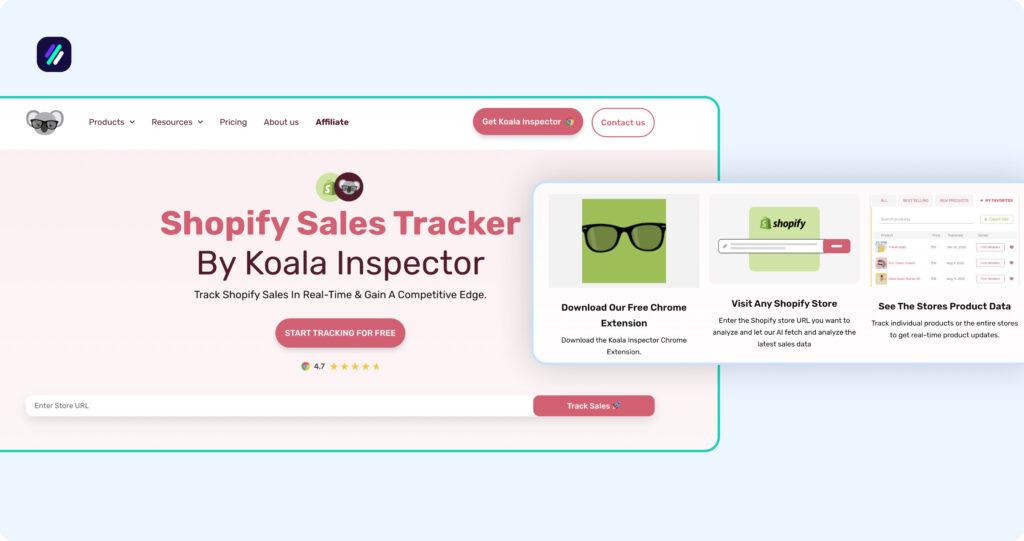
Koala Inspector is a Chrome extension that lets you see inside any public Shopify store. By entering a store URL, you can view the Shopify store product catalog, Shopify best sellers, estimated sales, traffic sources, and active ads. It also includes basic supplier-finding features via AliExpress search.
You can track multiple stores, save products to CSV for later use, and monitor changes in pricing or product launches. While Koala Inspector is easy to use and popular for quick competitive checks, its revenue accuracy can vary, and it’s limited to browser-based tracking.
Pros
- Easy-to-use Chrome extension for quick research
- Shows best sellers, estimated sales, and pricing history
- Offers basic ad and traffic source data
- Lets you track multiple stores at once
- Includes AliExpress supplier search feature
Cons
- Data isn’t always precise
- Works only in your browser
- Most advanced tools require a paid plan
- Limited historical and niche trend data
- No integration with other marketplaces or cross-platform analytics
Pricing
Koala Inspector offers a free plan with limited tools. Paid plans with advanced tracking features start from $17 per month.
Get insider tips—download the eBook on Shopify competitor research now!3. SellerCenter
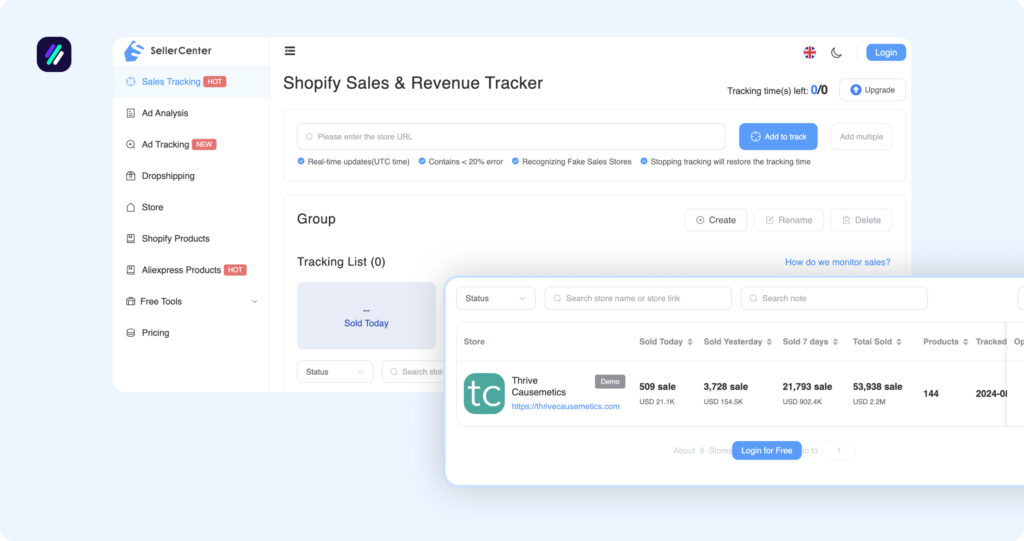
SellerCenter is built for Shopify sellers who want quick insights into competitor performance, product rankings, and trending keywords. You can browse top stores, view their best-selling products, and uncover the apps they use to run their business.
The platform also offers curated lists, such as the top 500 stores, and group monitoring so you can organize competitors into watchlists. With its browser extension, you can run store analysis directly while browsing.
Pros
- Covers both Shopify and ecommerce platforms like Lazada and Wish
- Offers curated insights such as the top 500 stores
- Includes keyword insights for finding trending products
- Group monitoring makes it easier to track multiple stores
- Browser extension allows direct store analysis
Cons
- Lacks built-in automation or push-to-store features
- Does not offer product imports or store syncing
- Some filters work poorly if the source data is incomplete
- Dashboard can feel clunky and heavily list-based
- No live chat or onboarding support for troubleshooting
Pricing
SellerCenter offers a free plan for beginners, with paid tiers from $9.99 to $99.99 monthly.
4. Dropship.io
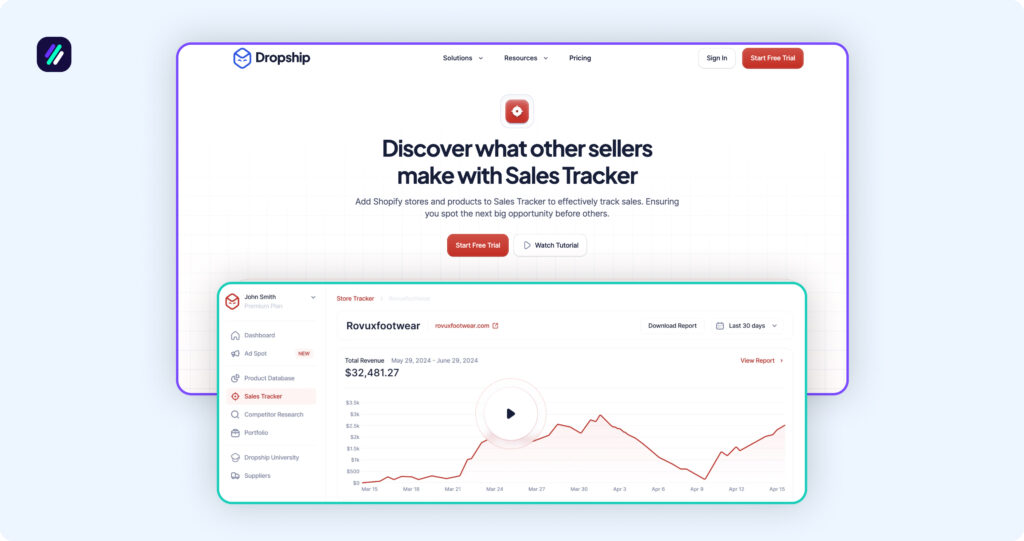
The Sales Tracker in Dropship.io lets you follow how products perform in Shopify stores. You can choose a store or a product you want to watch. Once it’s on your list, the tracker records sales numbers and price changes every day.
It also shows historical data so you can see if sales are growing, slowing down, or staying flat. For Shopify dropshipping, this means you can check if a product is worth selling before adding it to your store.
For anyone researching products, the tracker also offers filters to spot trends, compare performance between items, and see when a Shopify store starts or stops selling an item.
Pros
- Shows sales data over time
- Tracks individual products or whole stores
- Updates daily without manual checks
- Gives insight into competitor strategies
- Helps test product ideas before selling
Cons
- Data accuracy can vary
- Higher limits need a paid plan
- Doesn’t connect directly to your store
- Short 7-day free trial
- Can feel complex for new users
Pricing
Dropship.io starts at $39 per month, with a 7-day trial.
5. SpySales
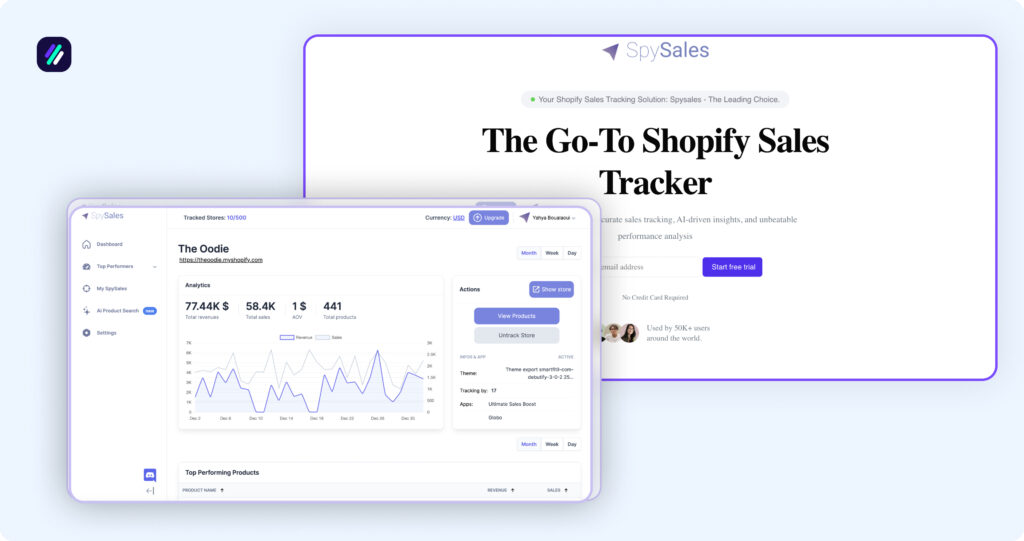
SpySales is a Shopify sales tracker that focuses on real-time sales data. You can track any Shopify store or Shopify listing and see daily sales numbers, top-selling products, and historical trends.
SpySales also has an AI-powered “Magic Search” to quickly locate trending products in your niche. And you can filter by top global stores or products, which helps you narrow your research to items with proven demand.
Pros
- Real-time sales tracking for any Shopify store or product listing
- AI-powered product search for finding winning items faster
- Easy-to-use interface for quick navigation
- Reveals top-performing products and stores in any niche
- Historical sales trends reveal long-term performance
Cons
- No deep traffic analysis
- Lacks advanced competitor analytics like customer behavior tracking
- No product or theme design insights
- 24-hour delay before tracking starts for new stores
- Fewer customization options compared to other Shopify dropshipping software
Pricing
Starting at just $25/month, you get tracking for up to 10 stores plus unlimited live sales tracking and AI research credits.
6. Analyzify
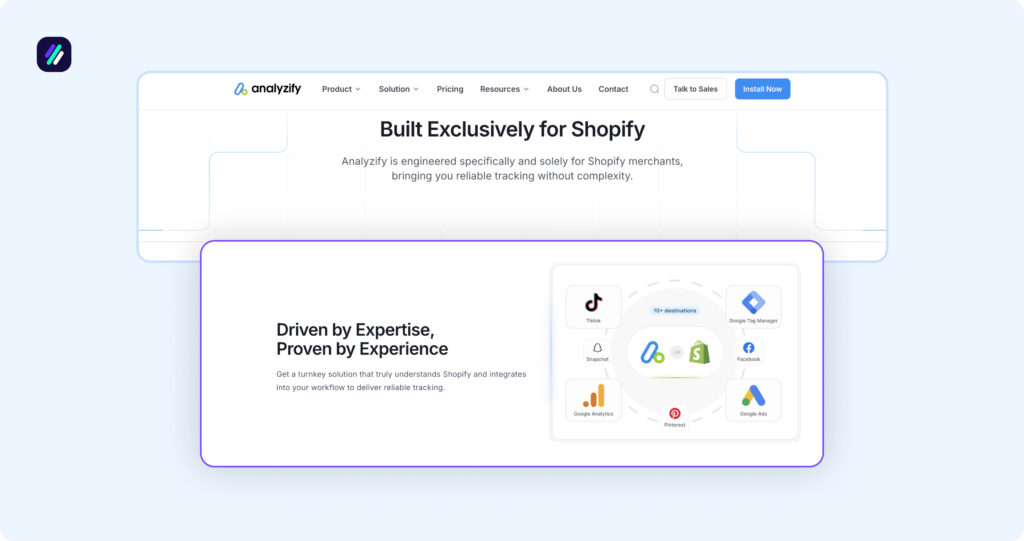
Analyzify is a Shopify data analytics and tracking app that integrates your store with Google Analytics 4, Google Ads, and over 10 other marketing platforms. Unlike sales trackers, it focuses on giving you accurate, enriched sales and conversion data across all channels.
For example, you can see not just how much a Shopify store sold, but also where those sales came from, what ads drove them, and which parts of your funnel need fixing. Plus, it includes server-side tracking for higher accuracy, which is crucial if you rely heavily on paid ads.
Pros
- Connects Shopify with GA4, Google Ads, Meta, TikTok, and more
- Fixes broken or missing tracking setups automatically
- Server-side tracking for high data accuracy
- Custom ecommerce funnels and transaction ID reports
- Expert setup and ongoing support to keep tracking up to date
Cons
- No direct competitor sales tracking like ecommerce spy tools
- Requires some analytics knowledge to fully leverage
- Higher cost than simpler analytics plugins
- May be excessive if you only need basic sales reports
- Best features require setup through their onboarding process
Pricing
Analyzify costs $945 a year (or $79 a month). This gets you tracking for up to 10K orders, expert setup, and integrations to 10+ marketing platforms.
7. PPSPY
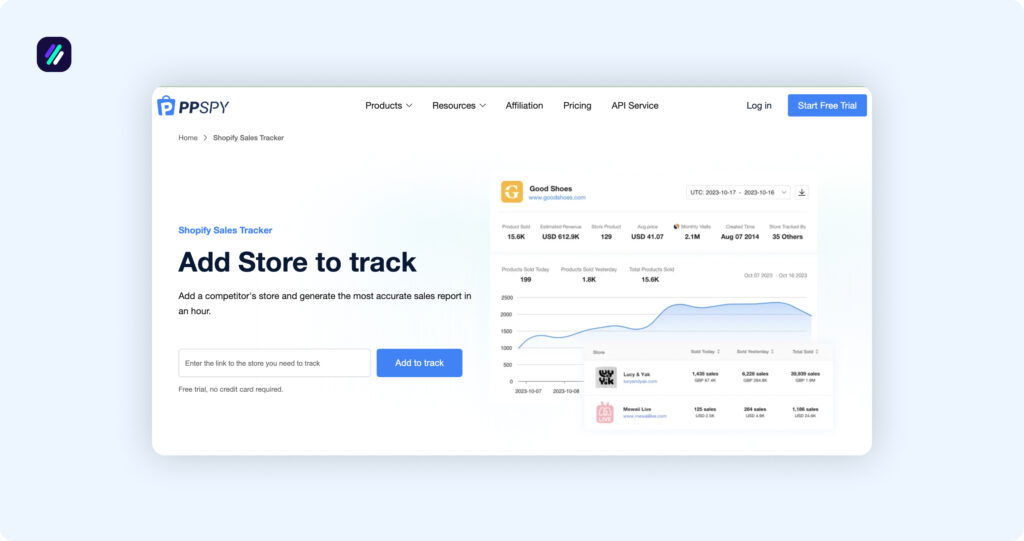
PPSPY is a Shopify spy and analytics tool that combines sales tracking, product research, and traffic analysis. It lets you track competitor sales and find winning products for your store.
PPSPY also shows what apps and themes successful Shopify dropshipping stores use, which helps you improve your own site. Plus, you can get alerts when competitors add or remove products.
Pros
- Tracks which stores are scaling fast
- Alerts when stores change product listings
- Reveals apps and themes used by top stores
- Shows exact competitor ads with engagement stats
- Includes store traffic analysis for deeper research
Cons
- Can feel like too much data if you’re just starting out
- Doesn’t include tools to find suppliers or import products
- Costs more than entry-level product research tools
- You’ll need to search manually since it doesn’t offer ready-made product picks
- Filtering options aren’t as flexible for very specific searches
Pricing
Plans start at $39/month. All plans include features like sales tracking, ad monitoring, data export, and Chrome extension access.
8. Shophunter
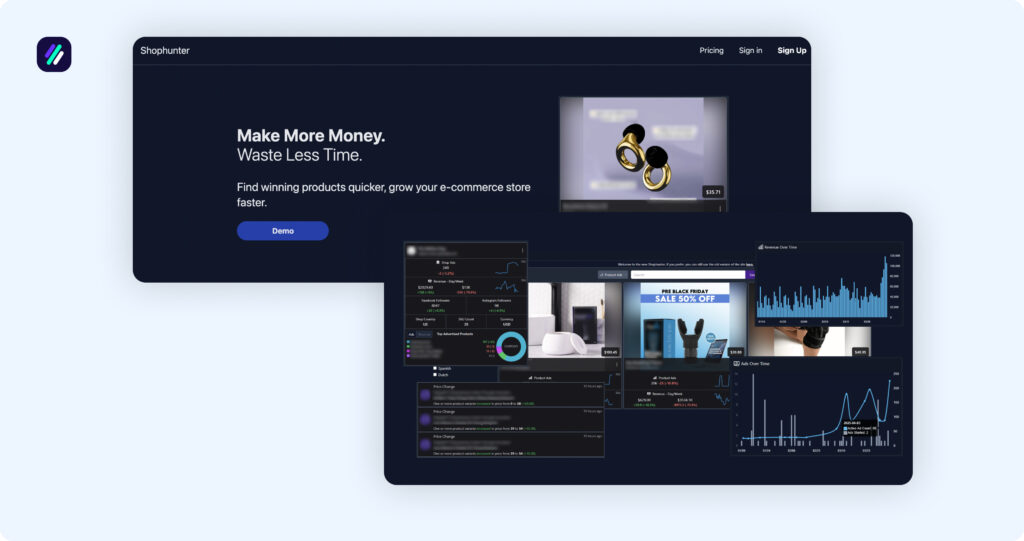
Shophunter might not be the flashiest Shopify sales tracker, but it gets the job done if you’re serious about understanding your competition. The tool lets you analyze sales, revenue, and ad insights for any Shopify store.
You can validate product ideas before committing, keep tabs on competitor stores, and even see the themes, apps, and Shopify marketing strategies they’re using.
Plus, Shophunter’s tagging system helps you organize tracked stores or products so you can quickly sort through to find what you need.
Pros
- Tracks sales, orders, revenue, SKUs, and variants
- Finds profitable trends and product opportunities
- Offers competitor analysis and price comparisons
- Easy-to-use interface
- Supports revenue and ad insights for any store
Cons
- Limited product search sources
- Search accuracy can vary
- Few customization options
- Pricing is on the higher side
- Lacks advanced filtering tools
Pricing
Shophunter pricing starts at $50/month, with a 3-day trial for $1.
9. WinningHunter
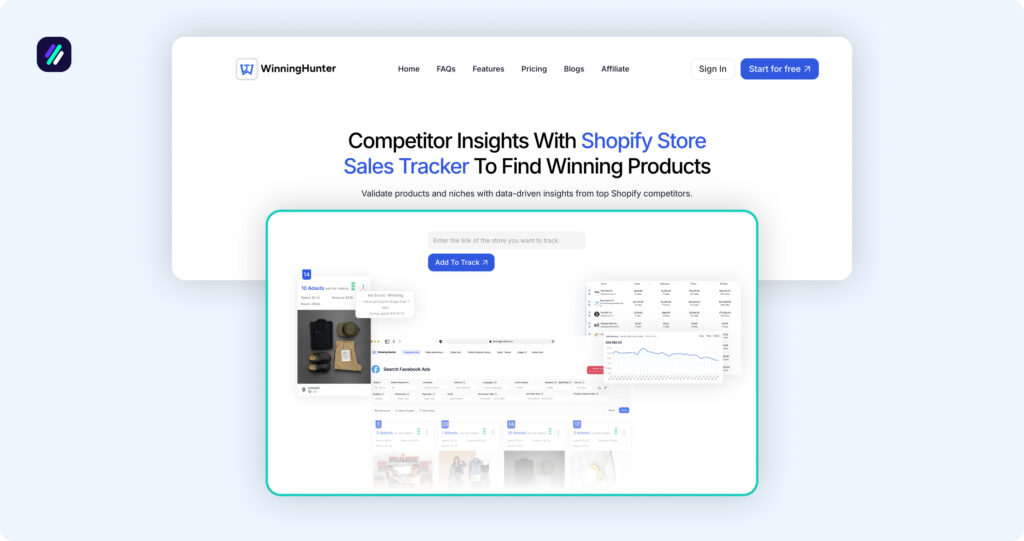
WinningHunter is a Shopify product research tool made for dropshippers who want to save time and money.
It lets you check real-time sales and store activity from competitors so you can analyze things before you invest. You can also track how fast a Shopify store is growing to spot products that are making money.
Pros
- Tracks Shopify sales so you can confirm product performance
- Shows which ads have the highest spend and are scaling well
- Covers both Facebook and TikTok ad platforms
- Lets you download tested ad creatives to save time
- Includes AI tools to find similar products and write ad copy fast
Cons
- Interface can feel complex and take time to master
- Focuses more on ad spying than broader product research
- Short 3-day trial may not be enough to test fully
- Starts at €49/month, which can be steep for beginners
- Lacks a direct product import feature for faster workflows
Pricing
Pricing starts from €49/month for tracking 25 stores, which is somewhat limiting.
What is a Shopify Sales Tracker?
A Shopify sales tracker is a tool that tracks sales performance from Shopify stores. It gives you numbers on revenue, top-selling products, and competitor activity so you can make informed decisions for your own store.
If you’ve ever wanted to see how well other stores in your niche are doing, these tools can show you. You can look up any Shopify store and see order counts, pricing changes, and which products are driving their sales.
The best Shopify sales trackers also give deeper market insights. You can filter by product category, view historical sales trends, estimate profit potential, and track sales by region to spot new opportunities.
Features to Look for in the Best Shopify Sales Tracker
So how do you pick the right tool? Use this checklist of must‑have features and what to verify before you commit.
- Data Accuracy: The tool should provide reliable numbers on store performance. Accuracy above 90–95% ensures the data you’re reviewing matches real sales trends.
- Real-Time Sales & Dashboards: See if updates happen instantly or with delays of hours or days. A good tracker should refresh quickly enough for you to react to trends the same day.
- Social Channels (What social media platforms Shopify stores use): Look for tools that identify which social media platforms the store uses. Check if it shows engagement metrics such as likes, comments, and video views.
- Ads Channels (What ad platforms they use): Verify that the tracker shows the ad platforms used, such as Facebook Ads, Google Ads, or TikTok Ads. See if it also tracks estimated spend and campaign types.
- Products They Sell: The tracker should list active products with images, titles, and pricing. Check if it shows how long each product has been selling and if it’s trending.
- Estimated Sales: A good tracker will estimate how many units of a product or store are sold in a given period. This metric helps measure demand and assess the competition’s success.
- Estimated Revenue: Pairing sales estimates with product pricing gives you a rough idea of revenue. This helps size up market potential and decide if a niche is worth entering.
- Historical trends & forecasting: Check if you can view sales history going back months or years. Bonus points if the tool uses this data to project future performance based on patterns.
Why Shopify Sellers Need a Shopify Sales Tracker
There are several good reasons to add a Shopify sales tracker to your product research toolkit. This kind of tool can help you:
- Monitor competitor performance: Get competitor revenue estimates, bestselling products, and pricing changes. With only 5% to 10% of Shopify stores finding success, this data can help you make better decisions to improve your store’s survival rate.
- Find winning items: Identify top-selling products, their prices, and how long they’ve been on the market. With 59% of shoppers more likely to buy when they easily find appealing items, stocking winning items can help increase conversions for your store.
- Improve profitability: See which products in your niche bring steady sales. This will help you eliminate underperformers and focus your budget on items that generate better returns.
- Scale your store: Track products that bring repeat orders and consistent demand. With 41% of ecommerce revenue coming from repeat customers, stocking these items can help you grow without losing profitability.
- Discover emerging trends: Spot products with sudden week-over-week sales growth early. In a market with over 5.8 million Shopify stores and thousands launching daily, being first gives you a strong competitive edge.
- Improve product selection: Learn which categories, price points, and styles sell best in your niche. You can then match your product lineup to what customers are already buying.
- Optimize marketing efforts: See which marketing channels drive the most sales for competitors, whether that’s Facebook ads, Google Shopping, or TikTok, and test them for your own store.
- Make data-driven decisions: Use historical sales data to spot seasonal patterns and time promotions. For example, knowing a product sold best in November last year lets you plan inventory and pricing ahead
FAQs about Best Shopify Sales Trackers
In this section, I am going to answer frequently asked questions about Shopify sales trackers:
What is the best Shopify Sales Tracker?
ZIK Analytics is the best Shopify sales tracker because it shows live sales, revenue, and product data from any store. It also finds suppliers, calculates profit margins, reveals competitor ads and tech stacks, and offers store-building tools to help you launch profitably.
How accurate are Shopify sales tracking apps?
Most Shopify sales trackers are accurate, but not equally so. Top trackers like ZIK Analytics achieve 85–95% accuracy using advanced algorithms, while others typically range from 80–90% depending on their data analysis methods.
Are Shopify sales using sales tracker?
Yes, Shopify sales can be tracked using sales tracker tools. Store owners get exact data from Shopify’s built-in analytics, and you can use independent trackers like ZIK Analytics to monitor any Shopify store’s sales performance.
Why is spying on Shopify competitors is effective strategy?
Spying on Shopify competitors is effective because it helps you see what’s already working for other merchants. You can identify trending products, ideal pricing, and effective marketing strategies to build a successful dropshipping business.











